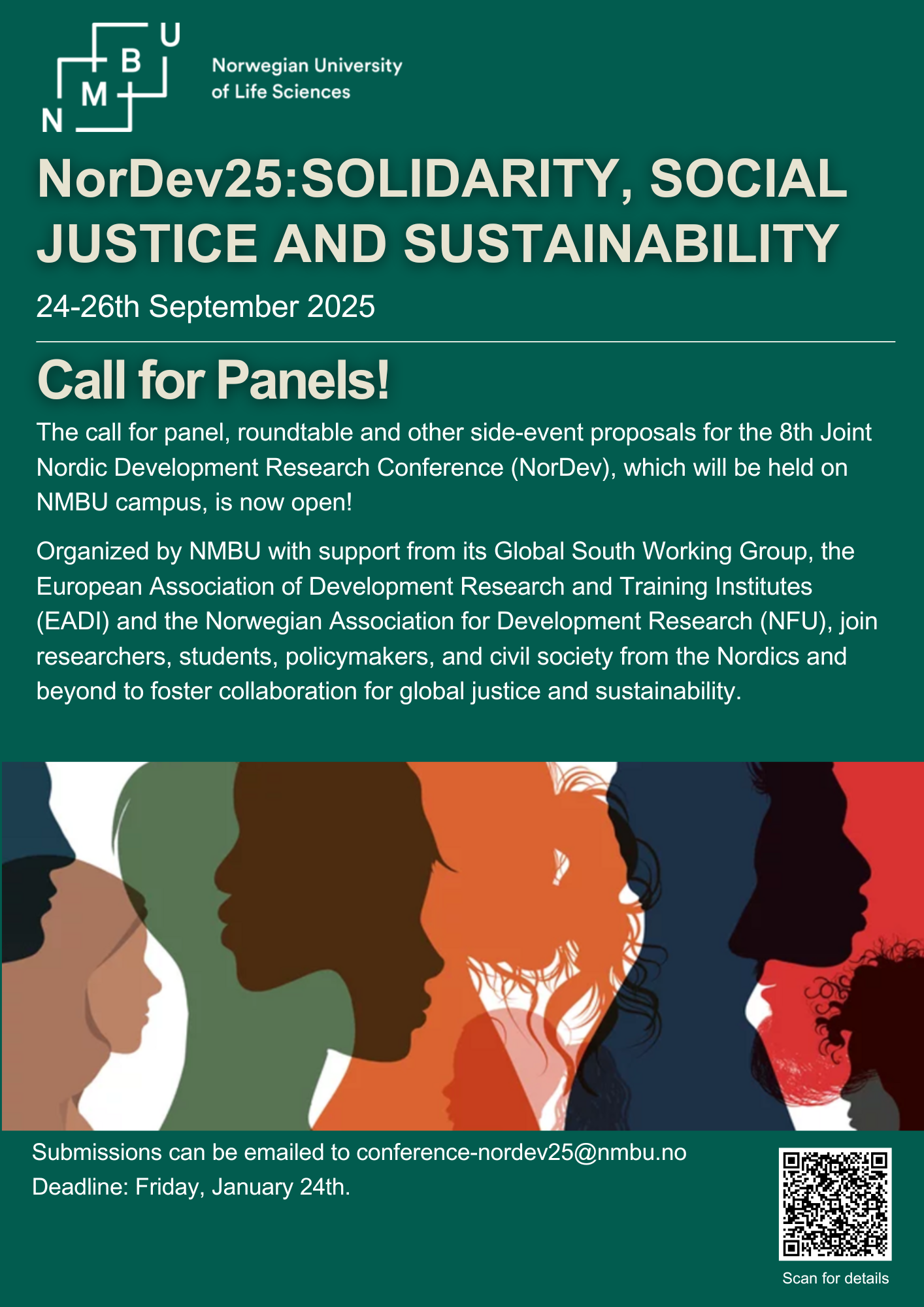24th – 26th September 2025, Norwegian University of Life Sciences
Please follow the link bellow and register in order to access the livestream:
https://www.nmbu.no/evu/nordev25-solidarity-social-justice-and-sustainability

24th – 26th September 2025, Norwegian University of Life Sciences
Please follow the link bellow and register in order to access the livestream:
https://www.nmbu.no/evu/nordev25-solidarity-social-justice-and-sustainability

We are calling for paper abstracts to the Open Panel Sessions listed below. Submissions of abstracts of no more than 250 words can be sent to conference-nordev25@nmbu.no.
Deadline: Friday, April 4th.

In order to be considered for inclusion in the program, please indicate clearly the number and title of the panel that you wish to contribute to.
We are also aiming to accommodate a limited number of panels for paper submissions that do not fit under the themes of the open panels listed below. If your paper does not fit withing a pre-identified panel, please label your submission with “Undefined Panel”.
List of Open Panels inviting abstract submissions
Growing inequalities, geopolitical instabilities, political polarization, new and protracted conflicts, anti-democratic and nationalistic tendencies and environmental and social injustices linked to unsustainable development trajectories and the “green transition” within and beyond the Nordic countries and Europe threaten to undermine academic and civic freedoms, human rights and development gains and efforts worldwide. The need for collaborative efforts, and critical thinking on “the global development project” and the root causes and solutions to the interlinked sustainability challenges of our times has never been greater. Yet while Nordic universities and development research environments have traditionally played a key role in championing global perspectives, and pursuing collaborative, internationally oriented research and teaching approaches, these activities are under increasing threat. Reforms in academic funding models (leading inter alia to the introduction of study fees for international students in Norway last year), changing geopolitical realities, and new and changing development assistance priorities and modalities are undermining the “global classroom” and weakening possibilities for international collaboration and solidarity. There is an urgent need in this changing context for enhanced Nordic cooperation and rethinking of the roles, responsibilities and possibilities for Nordic development research environments to foster and support inclusive and just transitions to sustainability both at home and abroad. The role of Nordic universities in contributing to inclusive and safe spaces for cross-cultural dialogue and fostering academic-civic solidarity and long-term institution building and reconstruction in the context of increasing geopolitical instabilities, war and protracted conflicts are also important and urgent topics.

🌍 Join the conversation on Solidarity, Social Justice, and Sustainability! 🌱✨
Our upcoming conference embraces inclusivity and broad perspectives on these critical themes. 🎤 Call for Panels, Workshops, & Side Events opens early December and closes January 24th—perfect timing to showcase your ideas!
Encourage PhDs, young scholars, and colleagues to start brainstorming submissions now. Let’s shape an inspiring and impactful program together!
💡 Learn more on our website https://www.nmbu.no/evu/nordev25-solidarity-social-justice-and-sustainability-be-held-nmbu-24-26th-september-2025.


The government continues to weaken internationalisation and cooperation within research and higher education with countries outside EU/EØS
The proposed Norwegian State budget for 2025 continues to weaken the possibilities for international cooperation of research and education with partners outside of Europe. In Panorama Nyheter you can read some of the reactions to new cuts, and the model where school fees in Norway are paid by the development aid budget. NFU Chair Arnhild Leer-Helgesen (UiA) and the leader of SAIH, Selma Bratberg, are among those who warn against the consequences of these continuous cuts:
A translation of the second article can be found here: (and then add a link to your translation).

